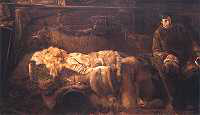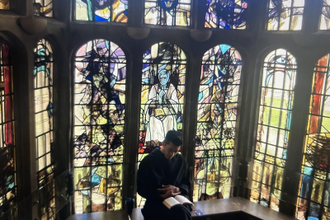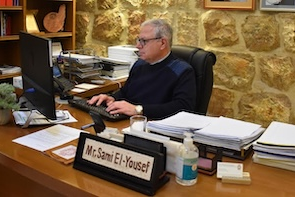Sunday Reflection with Fr Terry - 1 July 2012

Death of Helen - Malczewki
There is a mystery in death, and as we grow older we become more aware of this mystery. Death is a curtain, and behind it disappear our loved ones and our friends. It can be very hard to bear. If you have been at the bedside of a loved one who has passed away, you will have experienced the strangeness of the moment. Their body is still there, and yet, the person is not. It is as if the person you knew has gone.
No wonder we speak about 'the departed'. We have faith that death is not the end, and we believe that in God there can be a wonderful newness of life that will never end. But we still cannot see through that curtain.
Today's readings help us to ponder that mystery. The Book of Wisdom is a philosophical work from around the time of Jesus, in which Jews influenced by Greek philosophy seek to understand the world around them. Our first reading (Wis. 1.13ff) says that God's will for the world is life, not death. Not only that, but human beings, in particular, have a unique God-given blessing: we have within us the seed of immortality, because we have been made in the divine image. The core of our being will never pass away. From this life, yes, but not from life itself.
Our gospel reading from Mark 5 also gets us thinking about death. We meet two people of courage. First there is the synagogue official, Jairus who falls at the feet of Jesus. I wonder what humility it required for the man to do that? Synagogues were often big and beautiful buildings, and their rabbis and officials were greeted with respect. Here he comes to Jesus, an itinerant preacher with a reputation for healing, but shunned and treated with suspicion by the hierarchy. Jairus overcomes his pride and asks Jesus to help. But there is something else to be overcome: popular opinion. The crowds have come to their own conclusion.
There is no point in seeking help, she has died and that is that. How often do we hear the same voice of pessimism around us: It's no good. It won't work. Not just about healing, but about any attempt to help to make the world a better place. Jesus denies the scoffers, and we are given a rare moment of hearing his actual words, for the Aramaic language he used has been preserved for us: 'Talitha, kum!' 'Arise, young lady!'
The other person of courage is the woman suffering from a haemorrhage, perhaps some kind of menstrual problem associated with the change of life. Her condition was socially embarrassing and isolating, and in this sense was a kind of death. Moreover, she should not have touched Jesus, but she is driven forward by a kind of faith and by desperation. Note how Jesus accepts her, indeed, is impressed by her courage.
God is the God of life, who desires us to arise from whatever holds us back. We carry God's image within us, and as part of this we can never be quite content with leaving the world the way it is. There is always love to be done. There are always people to be helped. There is always faith to be encouraged, broken hearts to be healed. Love resists death. Life must get through, and love sustains life and seeks the fullness of life. With the wonderful reassurance that in the end none of it is wasted, for our life is taken into the life of God.















